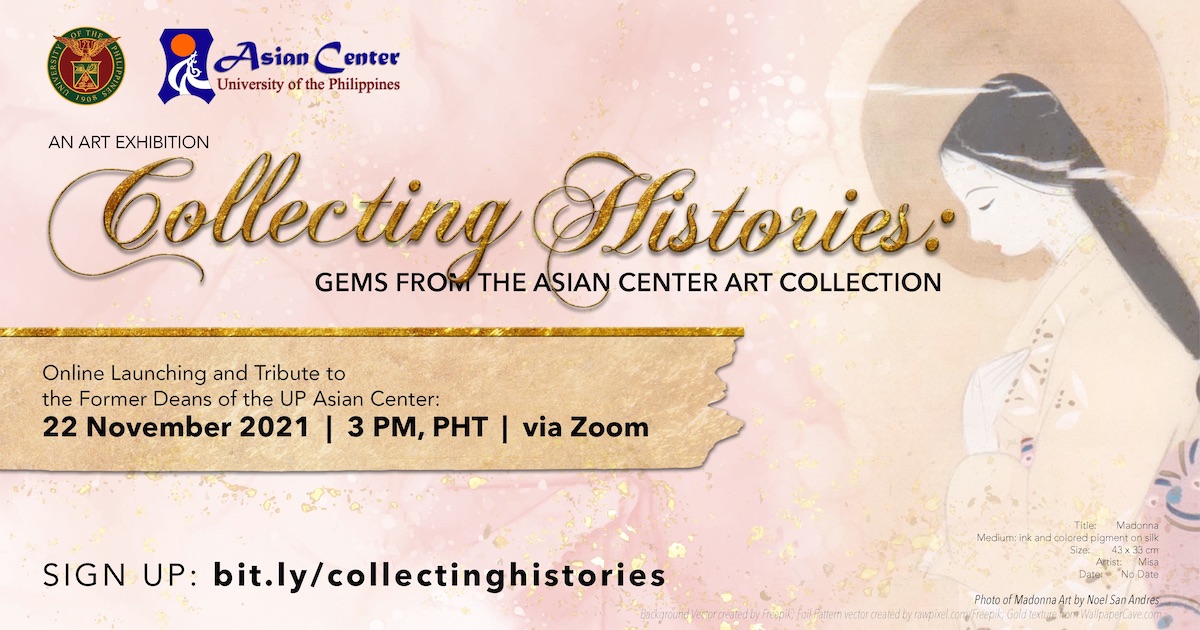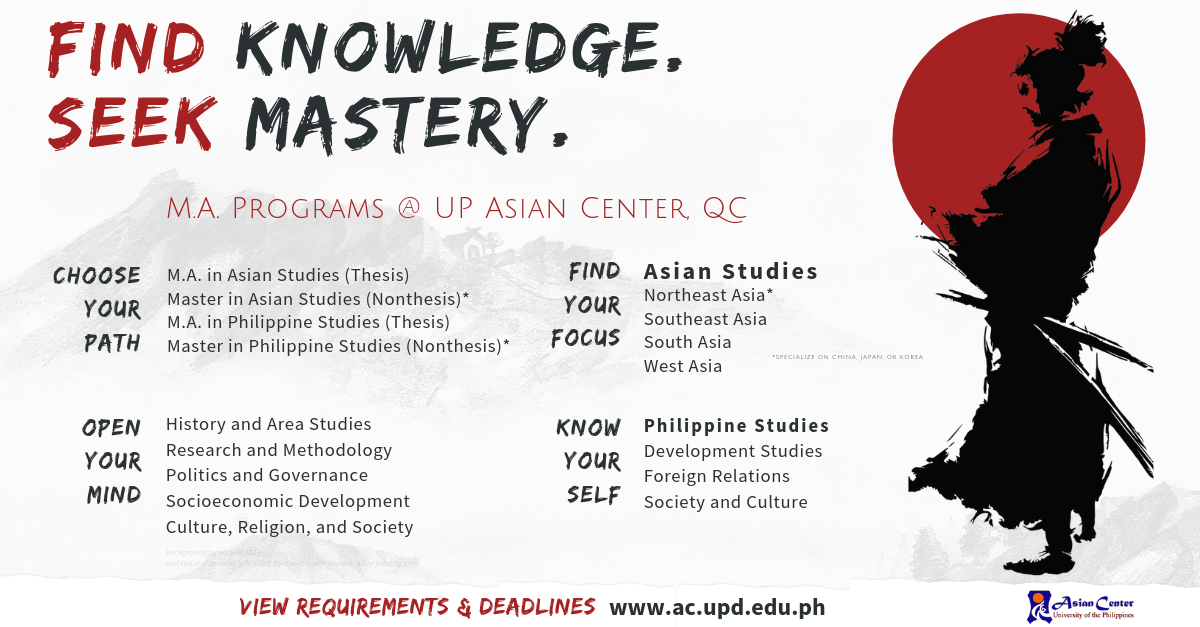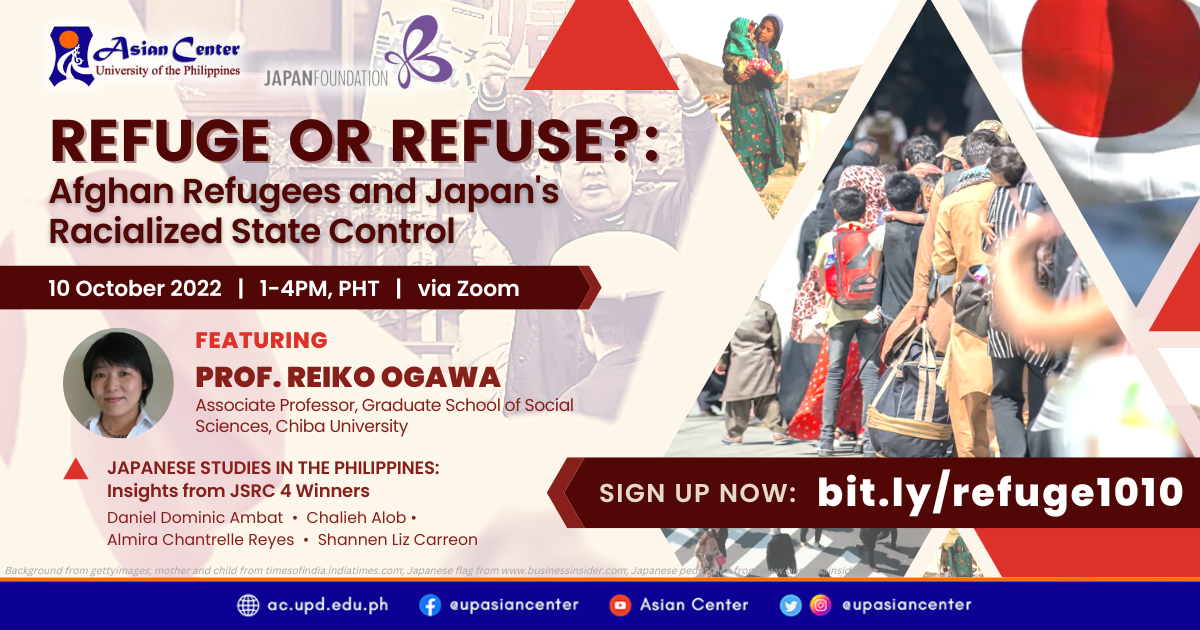The UP Asian Center will be holding a virtual launch—via Zoom—of the online exhibit, “Collecting Histories: Gems from the Asian Center Art Collection” on 22 November 2021, 3:00pm to 6:00pm, Philippine Standard Time. The event is free and open to the public, but interested participants are required to register using an authenticated Zoom account.
Discover the Asian Center Art Collection
This exhibit showcases works that originate from, or were inspired by the arts of, Southeast Asia, India, Iran, East Asia, and the Philippines. All exemplify different styles and techniques: from Indonesian leaf art, Mughal-style painting and “temple rubbing” to Chinese ink painting, Okinawan rice-resist dyeing, palette-knife, and Persian calligraphy, nasta’liq style.
The collection includes two works by Leonilo Doloricon (“Mangingisda” and “Continuing Revolution”), a modernist Indian expressionist painting by M. Sivanesan; an oil painting, The Liberation of Manila (February 1945), by Vars Rosal; and a Chinese ink painting by Zeng Houxi.
Many of these works have not been seen for decades; others are unknown, and the Asian Center takes pride in showcasing them anew to the public. Held as part of the Asian Center’s 66th anniversary, the exhibit is a celebration of AC’s history, and represents the first effort to revive the Asian Center Museum, whose webpage is being revamped as part of the online exhibit.
VIEW REGISTRATION and IN-WEBINAR GUIDELINES (NEW!)
The Asian Center: A History and Overview
The Asian Center, since its establishment in 1955 as the Institute of Asian Studies, is known as the Philippines’ premiere culture and research center on Asia. Back then, with its name as evidence of its colorful history after having been changed so many times (from IAS, to AC, to PCAS, and back to AC), it was the home of legendary and pioneering scholars and academicians such as F. Landa Jocano, Cesar Adib Majul, and Josefa Saniel.
With the wide-ranging expertise of the center, AC (as PCAS) also became the brains of Philippine Foreign Policy. True to its mandate, the Asian Center became the primary venue for the Philippines’ broadening and growing relationship with its Asian neighbors. It became known as UP’s “embassy,” its representative in international and Asian affairs and a symbol of the Philippines’ flourishing relations with Asia through academic and cultural exchange.
The Asian Center Museum
A testament to these strengthened relations is the Asian Center’s collection of art works, cultural artifacts, and materials. These were mostly given as gifts and donated by the institution’s friends from other Asian countries, as well as renowned colleagues in the academe. These were housed in the Asian Center Museum in the institution’s old building, the Romulo Hall.
However, the deterioration of Romulo Hall and the increasing number of students brought about the discontinuation of the AC Museum and later led to the transfer and storage of its collection to the GT-Toyota Asian Cultural Center, a facility donated by Toyota Motor Philippines Foundation in support of the Asian Center’s mandate.The launch of the exhibit represents an initial effort to revive the Museum, and includes a tribute to former deans of the UP Asian Center.
Inquiries and Anniversary Activities
For inquiries, please contact This email address is being protected from spambots. You need JavaScript enabled to view it..
The launch of the online exhibit is one of several activities for the Asian Center's 66th anniversary. The theme for this year's celeration—Continuity and Change: The Asian Center at 66. View full list of activities.
The UP Asian Center offers M.A. degrees in Asian Studies with four fields of specialization: Northeast Asia, Southeast Asia, South Asia, and West Asia. The Center also has an M.A. program in Philippine Studies that allows students to major in Philippine society and culture, Philippine foreign relations, or Philippine development studies. The Center offers a Ph.D. program in Philippine Studies in conjunction with the College of Arts and Letters and the College of Social Sciences and Philosophy. For an overview of these graduate programs, click here. The Asian Center also publishes Asian Studies: Journal of Critical Perspectives on Asia, the latest issue of which can be downloaded at the journal's website. For other news and upcoming events at the Asian Center, click here.








